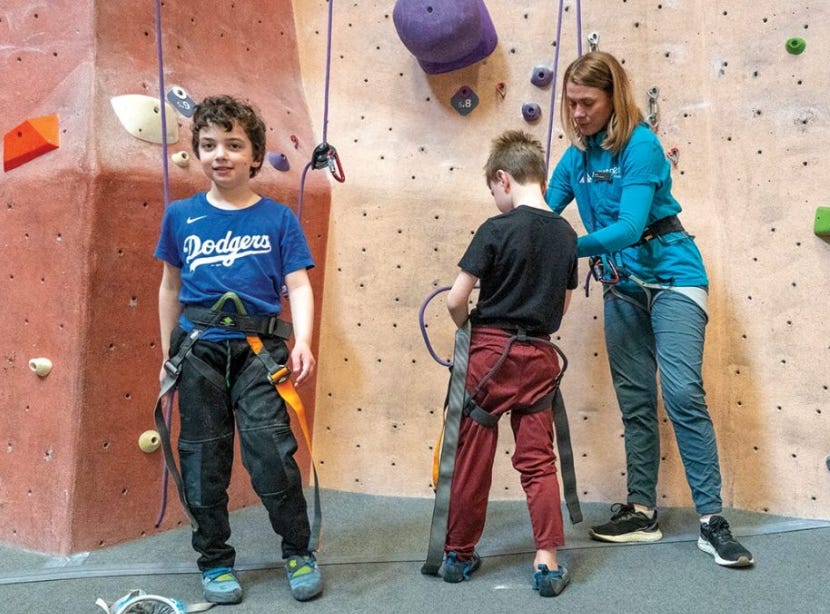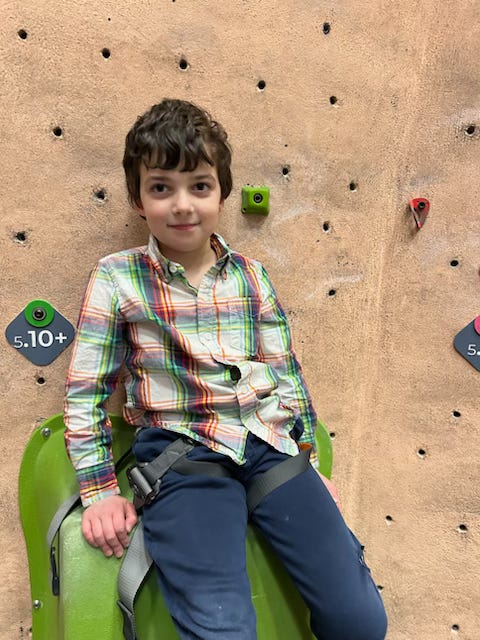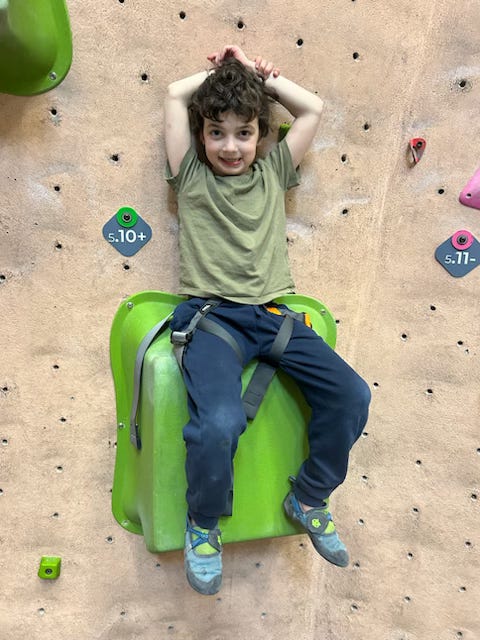Yep, I wrote about my own kid this time
What does it mean to use our own experience to frame issues?

People who live in the D.C. area and read Bethesda Magazine might open this latest issue and find a smiling kid in a Dodgers shirt and harness at a rock climbing gym. He looks like a regular kid, whatever regular means, and rock climbing is a great sport, so what’s the news about?
Turns out that rock climbing, particularly at a gym in our area, can be a really great activity for neurodivergent kids. And the kid being featured happens to be my own.
I’ve written about my own kid(s) before - particularly my middle kiddo who has a life with more twists and turns than the other two. There is a lot of lip service paid to finding one’s own path, or marching to the beat of your own drum, and effort spent carving out a niche or being part of some camp’s inclusion program - but it looks a lot different when you’re just trying to be a regular kid growing up in a world that is confusing, loud and full of way too many expectations.
I had originally pitched this story about the rock climbing gym because I wanted parents to know about it, and see that there are options for kids who don’t take well to the soccer field or baseball diamond. But the editor came back with an ask: would I want to do this and feature my own kid?
I have written about Micah before (notably in Time Magazine) but even then I just used his first initial and didn’t include a picture. Also, while Time is widely read on a national level, Bethesda Magazine is widely read on a local one. Meaning that the people we know and the people who know Micah are the ones reading it.
So I asked him - would he be open to it? And he was, which surprised me. Maybe all my years of harping on the power of narrative journalism rubbed off on him. Or maybe he was just proud of his experience and felt comfortable enough to share it.
We’ve struggled to find activities that work for Micah for years. YEARS. Team sports haven’t worked well, for all the predictable reasons one can imagine: the fast-moving kids, the inflexible rules, the absence of a natural athleticism that comes so easily to others. But we’ve wanted him to do something physical. It’s good for him, it’s good for us - it gets him out of the house and moving his body. But we’d burned through a list of options and kept searching for what might be good.
And then we stumbled upon rock climbing.
In third grade, Micah made a close friend at school, giving us another family to collaborate with in finding a physical activity the boys could do together. They’d heard of Movement, and after a few calls and emails we were connected to Irina.
Most weekends, the two boys share a one-hour private lesson with Irina, 39, who has been at Movement for more than two years. Micah is one of four neurodivergent climbers she works with on a regular basis…Climbing is particularly helpful for neurodiverse kids, she explains, because it helps them increase their understanding of where their body is in space, which is something that doesn’t always come easily.
“Climbing requires a lot of unusual moves that we don’t usually do when walking or running or exercising on the ground: constant change of our center of gravity, weight shifting and balancing, while pulling and pushing. You need to be very in control of your body to be able to deal with gravity,” she says. “And it trains your brain to develop this body awareness better.”
So now that this story has been out in the ecosystem, here’s my own take on the reaction and writing process:
Being outed as neurodivergent isn’t the big deal it once was. Anyone who spends time with Micah is going to see that his quirks and intellect would likely place him in that camp, and most of us who live in the big, wide world know someone who would identify as ND and still lead a happy, productive life. When we talk about progress on social issues, it’s amazing to see how far we’ve come as a society both for accepting kids who are different and having resources for them.
The lure of team sports is still strong, even with a child who can’t do them. Summer means swim and dive season for us and I already see how it takes our household by storm, in a way that Micah’s solitary activities are unlikely to do. I don’t anticipate that he will do any sort of competition with rock climbing, nor does he need to do that to have fun and learn skills in the sport. But it’s a larger reflection of why team sports have such an outsize effect on people and families, and something I want to spend more time mulling over.
The story ends on a positive note, but it’s not overly saccharine. It doesn’t pretend that finding a good activity solves so many of the problems, nor does it show that the activity itself always goes smoothly. I want to show the good with the bad, the hard with the brief wins, the way that we struggle to find something that works, and struggle again to keep it working for as long as possible.
It’s a nice reminder of the thrill of print magazines. We subscribe to a few hard copies of papers/magazines but most of our news is online. Still, the ability to flip open a magazine, see a face you recognize, and have it be something you can tangibly hold in your hands is pretty amazing. Long live print media.
And what did Micah think of the entire experience?
Keep reading with a 7-day free trial
Subscribe to It Doesn't Have to Be This Hard to keep reading this post and get 7 days of free access to the full post archives.



